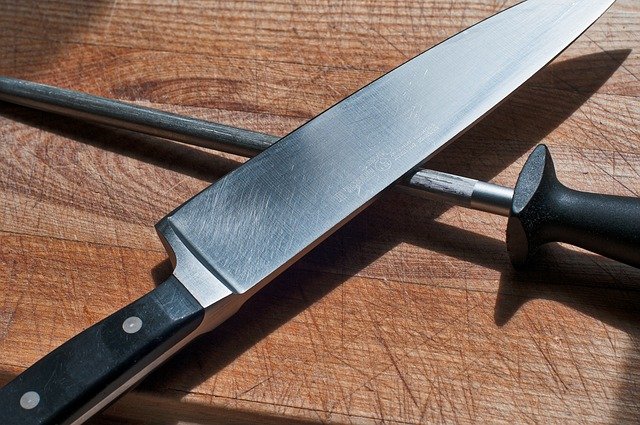Each trade has its own set of specialized tools. Auto mechanics, carpenters, plumbers, electricians, and all others have their own instruments unique to their individual professions. But nearly all such vocations rely on some type of cutting tool.
As a taxidermist, my father used countless knives during his career. In the course of most days’ labor, he employed everything from scalpels to paring knives to power saws. Animals had to be skinned, hides fleshed, antlers removed, and pelts cut to achieve desired outcomes. Dad sought out and paid top dollar for high quality blades in order to work efficiently.
To keep those blades sharp, he also used various sharpening mechanisms. One of the most common was a steel that he would use to restore precision cutting edges. As I child I marveled at how quickly dad would move his knife over the sword-like steel without thought or concentration. He had done it so often his movements became automatic and his knives razor sharp. I am blessed to now have not only some of his knives but also some of his sharpening steels. Unfortunately, I am unable to make them sing like he could.
Metal has been used to sharpen other metal implements ever since metals were first created. Genesis 4:22 tells us that even before Noah’s flood, Tubal-Cain forged all kinds of tools out of bronze and iron and later, Solomon observed in Proverbs 27:17 that iron sharpens other iron.
But Solomon didn’t stop there. He went on to say that just as iron sharpens iron, so one man sharpens another. Wise Solomon realized that no one individual possessed all knowledge and insight and that we can help each other improve.
Sharpening each other occurs whenever we discuss an item of common interest. Whether it is God’s Word, politics, or some hobby, each person can contribute to the discussion and offer thoughts and ideas. In that process, all become sharper as opinions are exchanged, debated, and shared.
That’s not to say that all ideas are equally viable. At times, as we discuss our thoughts with others we realize some of our notions are incomplete or even wrong. But in order for that to happen, free and open dialogue must not only be allowed but encouraged.
Unfortunately, when ideas or opinions are silenced we are the duller for it. Whenever comments are cancelled because they are deemed politically incorrect or offend pop culture, we lack the ability to put an edge on our blades. Although discussions should be respectful and courteous, we must be free to disagree without the threat of losing our relationships or reputations.
In order for iron to sharpen iron, the dull cutting edge is honed by removing part of the knife. If the knife had feelings, I’m sure this would hurt. But the result is a blade that is more valuable and useful.
We must stand up to error and admonish each other when needed and we must be open to the correction of others. Failing to confront obvious faults results in less effective knives and duller people. Rotten wood doesn’t hurt the iron, but it sharpens nothing.
This is another compelling reason to be a part of Jesus’ Church where fellow believers can help each other toward maturity. No knife can sharpen itself and we need each other as we examine God’s Word and discuss His will together.
Ultimately, Christians benefit from the constant honing of the Holy Spirit in our lives. He has a way of convicting us of sin and creating not just a clean heart but a fine edge that can be an effective and useful tool in the hand of our Creator.
The next time we pick up a knife to peel an apple or slice a tomato, may we remember how iron sharpens iron. And may these thoughts motivate us to both submit to being sharpened ourselves and to helping to sharpen our brothers and sisters.
Blessings, George
